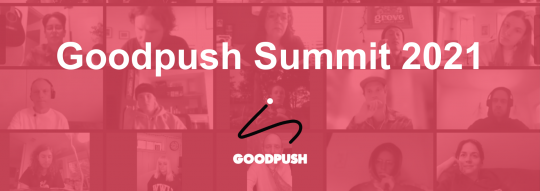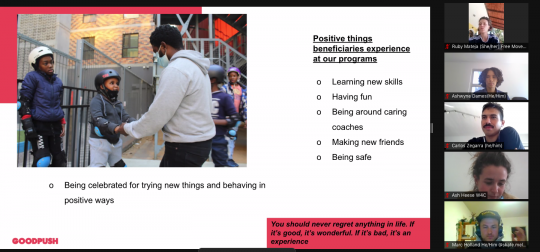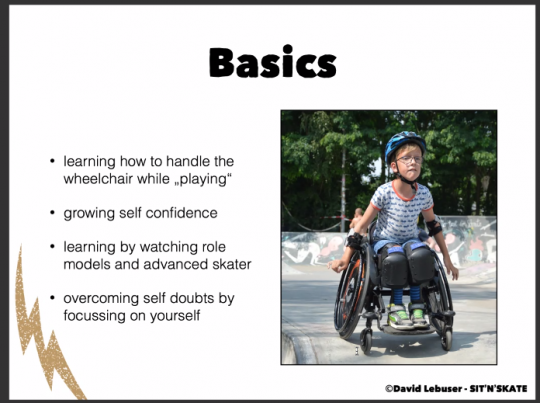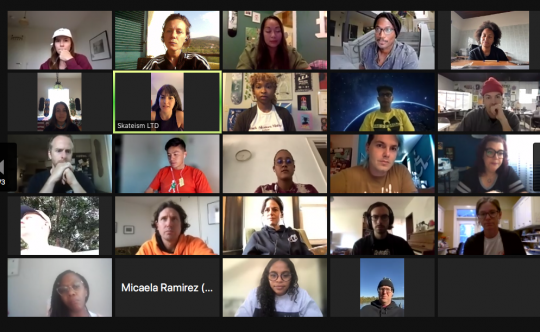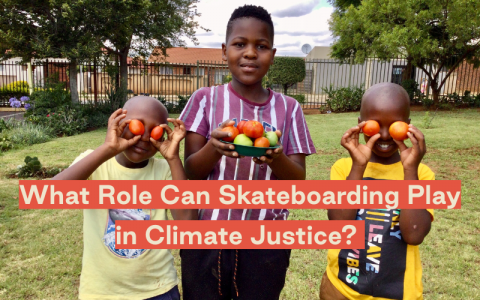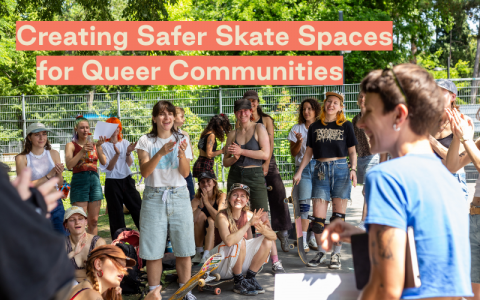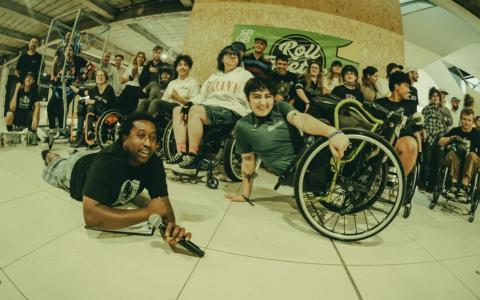Last week we hosted our first online Goodpush Summit, joining together for three days of workshops focused on Mental Health, Inclusive Skateboarding and Sustainability. More than 475 people from 240 organizations and initiatives took part in the Summit! Hearing perspectives from all over the world, we discussed the triumphs and shortfalls of the current social skateboarding landscape and how we can work together towards a more collectivized and supportive future.
(Link to all recordings at the bottom)
Day 1 - Mental Health & Wellbeing
We kicked off this year’s Summit with a topic which has become a central theme, close to many skateboarder’s hearts – mental health. Whether you are a skatepark owner, the founder of an organization, a participant, volunteer, a grant-maker, or even just an avid skateboarder, you have most likely thought about the connection between skateboarding and mental health. You may have experienced the benefits of skateboarding for your own wellbeing and self-care and wonder if you can pass this on to others. The first session of the Summit gave an overview on the data behind Social Change through Skateboarding worldwide.
In this first day of workshops, Ashwyne Dames (an educator at Skateistan South Africa) shared some practical methods from the MindPower curriculum which Skateistan have implemented into their skate programmes. MindPower was developed by Waves for Change and Health Warriors in 2020 and we at the Goodpush are now working to make it available for free to the wider social skateboarding community on our new e-learning platform (coming soon – stay tuned!)
Ashwyne’s workshops encouraged us to consider how participants in social skateboarding programmes may be negatively affected by external factors, and how these uncontrollable outside factors may affect their internal worlds. Ashwyne demonstrated how behaviour, feelings and thoughts affect each other and how positive changes in one aspect can help one to cope with life’s challenges. We practised some mindfulness exercises together and discussed the effects these had on our bodies and our minds, as well as how we can practically implement them into skateboarding curriculum.
Day 2 - Inclusive Skateboarding
The fact that so many individuals and organizations around the world are using skateboarding programmes for increasing inclusivity shows that – with the right input – it can be an incredible tool for creating positive social change. However, we must be careful not to put skateboarding on a pedestal and remove ourselves as active agents in the direction it flows. For many marginalized groups, the experience of feeling welcomed, safe and provided for in a skatepark is one that they have never known. Which is why we’re here, having these conversations. To learn from others and to ensure that anyone – regardless of their age, gender, ethnicity, race, ability – will see themselves reflected in skateboarding spaces/culture and thus know that they are welcome there.
We began the day with presentations from David Lebuser (WCMX pro and co-founder of Sit’n’Skate) and Linda Ritterhoff (skate coach with Drop In e.V. and Berlin on Board) about how to make skateboarding programs more inclusive for people with disabilities and wheelchair skaters. As well as the physical barriers that might stop someone from entering a skatepark, we spoke about the importance of role models in helping others to overcome self-doubts. As David highlighted, as disabled people or wheelchair users, you are constantly told about the places that you ‘cannot go’. The skatepark should be a place that is accessible for everyone who wants to go there; to allow people to build their confidence and to overcome the idea that they cannot go into places because of their disability.
Following the launch of the Pushing Against Racism Commitment on May 25th, our second panel on day 2 addressed racism within skateboarding. Our speakers explained that by signing the Commitment you are not only recognizing that racism exists within the skateboarding world, but also acknowledging its structural roots which lie deeper than what you might witness on the streets or at the skatepark. It is not enough to identify as anti-racist, we need to pull together and look around ourselves to see what really needs changing. This includes representation of skaters of color at all levels of the community/industry, financial support, and other opportunities. An important first step is to admit where we’ve done things wrong (on a personal level and a broader societal level), and to have honest conversations of how to progress from there.
Our final panel of the day, Queer and Trans Inclusion, featured guest speakers ranging from program mangers, coaches, LGBTQI+ role models and researchers. Alexandria Berriochoa (Skate Like a Girl) shared her experiences of re-finding her skateboarding community after coming out as trans. Addressing the contradiction of creating exclusive spaces for inclusivity, she reiterates the necessity of these spaces for queer and trans people, to allow non-traditional skaters to ‘fail until they get it right’. A luxury mostly reserved for 'traditional' skaters within the skatepark.
Day 3 - Sustainable Organizations
The third and final day of this year’s Summit was all about sustainability: how we can ensure stability, staff and participant wellness, growth and impact. First we heard about Fundraising from two members of the Skateistan team, Alyssa Bialowas (Communications Officer) and James Green (Development Officer), who shared their expertise and tips for using communications tools to engage a donor database and ensure longevity within a social skateboarding organization. Which nicely led onto our presentations on Measuring Impact, where we heard about the different methods of gathering meaningful information and why it is so important for the governance of an organization, but even more so for the continuous learning and progression it allows.
In the final panel about the Future of Social Skateboarding, Marie Mayassi (Melanin Skate Gals & Pals) reiterated the importance of exclusive groups – be that hosting meet-ups and creating safe spaces for BIPOC folks, LGBTQI+, girls and women*. She added that these groups should be encouraged and motivated to work together and collaborate through workshops and events. Working towards a more intersectional approach where exclusive groups remain independent for their own rights whilst cooperating and uplifting each other.
Final Thoughts
It seems apt to reflect on Dr. Indigo Willing’s comment in the Pushing Against Racism panel – that the trajectory should not be working out how to secure people of color a seat at the table, but rather to burn the table and start over. Now, we all know that there is no future without the past and not to deny the great progress and seeds that have already been sowed to move forwards. However, in order to do so we need a shared recognition and willingness to admit mistakes and make changes. Only from that point will we have the foundations to move towards true inclusivity in the skateboarding world and beyond.
